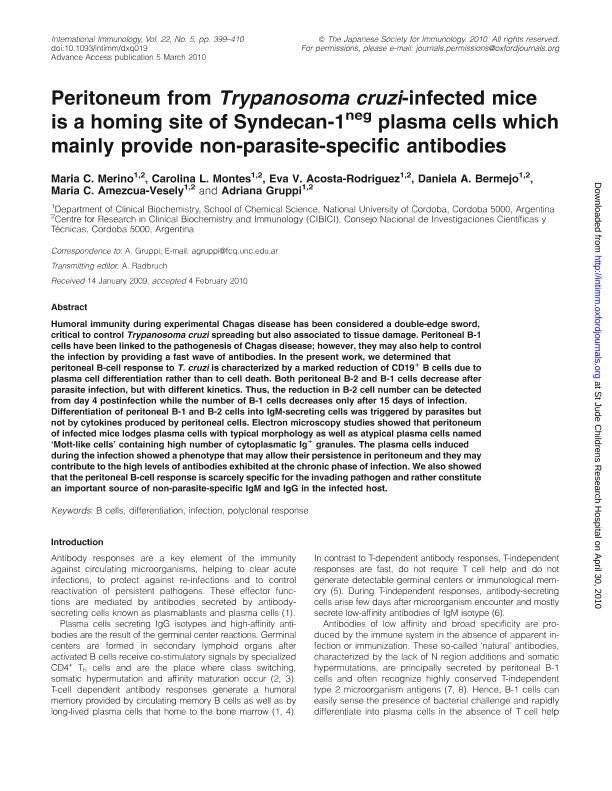Artículo
Peritoneum from Trypanosoma cruzi-infected mice is a homing site of Syndecan-1negplasma cells which mainly provide non-parasite-specific antibodies
Merino, Maria Cecilia ; Montes, Carolina Lucia
; Montes, Carolina Lucia ; Acosta Rodriguez, Eva Virginia
; Acosta Rodriguez, Eva Virginia ; Bermejo, Daniela Andrea
; Bermejo, Daniela Andrea ; Amezcua Vesely, Maria Carolina
; Amezcua Vesely, Maria Carolina ; Gruppi, Adriana
; Gruppi, Adriana
 ; Montes, Carolina Lucia
; Montes, Carolina Lucia ; Acosta Rodriguez, Eva Virginia
; Acosta Rodriguez, Eva Virginia ; Bermejo, Daniela Andrea
; Bermejo, Daniela Andrea ; Amezcua Vesely, Maria Carolina
; Amezcua Vesely, Maria Carolina ; Gruppi, Adriana
; Gruppi, Adriana
Fecha de publicación:
03/2010
Editorial:
Oxford University Press
Revista:
International Immunology
ISSN:
0953-8178
e-ISSN:
1460-2377
Idioma:
Inglés
Tipo de recurso:
Artículo publicado
Clasificación temática:
Resumen
Humoral immunity during experimental Chagas disease has been considered a double-edge sword, critical to control Trypanosoma cruzi spreading but also associated to tissue damage. Peritoneal B-1 cells have been linked to the pathogenesis of Chagas disease; however, they may also help to control the infection by providing a fast wave of antibodies. In the present work, we determined that peritoneal B-cell response to T. cruzi is characterized by a marked reduction of CD19+B cells due to plasma cell differentiation rather than to cell death. Both peritoneal B-2 and B-1 cells decrease after parasite infection, but with different kinetics. Thus, the reduction in B-2 cell number can be detected from day 4 postinfection while the number of B-1 cells decreases only after 15 days of infection. Differentiation of peritoneal B-1 and B-2 cells into IgM-secreting cells was triggered by parasites but not by cytokines produced by peritoneal cells. Electron microscopy studies showed that peritoneum of infected mice lodges plasma cells with typical morphology as well as atypical plasma cells named 'Mott-like cells' containing high number of cytoplasmatic Ig+granules. The plasma cells induced during the infection showed a phenotype that may allow their persistence in peritoneum and they may contribute to the high levels of antibodies exhibited at the chronic phase of infection. We also showed that the peritoneal B-cell response is scarcely specific for the invading pathogen and rather constitute an important source of non-parasite-specific IgM and IgG in the infected host. © The Japanese Society for Immunology. 2010.
Palabras clave:
B CELLS
,
DIFFERENTIATION
,
INFECTION
,
POLYCLONAL RESPONSE
Archivos asociados
Licencia
Identificadores
Colecciones
Articulos(CCT - CORDOBA)
Articulos de CTRO.CIENTIFICO TECNOL.CONICET - CORDOBA
Articulos de CTRO.CIENTIFICO TECNOL.CONICET - CORDOBA
Articulos(CIBICI)
Articulos de CENTRO DE INV.EN BIOQUI.CLINICA E INMUNOLOGIA
Articulos de CENTRO DE INV.EN BIOQUI.CLINICA E INMUNOLOGIA
Articulos(INIMEC - CONICET)
Articulos de INSTITUTO DE INV. MEDICAS MERCEDES Y MARTIN FERREYRA
Articulos de INSTITUTO DE INV. MEDICAS MERCEDES Y MARTIN FERREYRA
Citación
Merino, Maria Cecilia; Montes, Carolina Lucia; Acosta Rodriguez, Eva Virginia; Bermejo, Daniela Andrea; Amezcua Vesely, Maria Carolina; et al.; Peritoneum from Trypanosoma cruzi-infected mice is a homing site of Syndecan-1negplasma cells which mainly provide non-parasite-specific antibodies; Oxford University Press; International Immunology; 22; 5; 3-2010; 399-410
Compartir
Altmétricas



